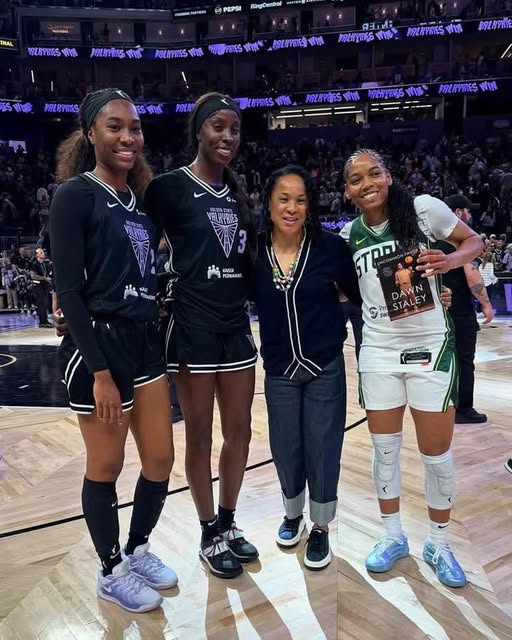As Her Former Gamecocks Dominate and Shine Brightly on the Court, Dawn Staley Takes a Proud Seat at the Sidelines
The gymnasium is alive with energy. A sea of garnet and black ripples through the crowd, chants echoing from one corner to the next. On the hardwood, former South Carolina Gamecocks—now WNBA stars, Olympians, or elite-level pros overseas—execute dazzling plays with grace, grit, and sheer power. Amid the applause and camera flashes, one figure sits quietly courtside. Her expression is calm but intense, eyes scanning every move, every pass, every decision. This is Dawn Staley, and though she’s no longer coaching these players directly, her presence is felt in every pivot, every pass, every huddle.
She watches them the way a sculptor might admire a finished statue or a composer listening to a symphony that began in their mind. Her former players are now leaders, champions, and role models in their own right—but to them, and to Staley, the connection is eternal.
“This is the reward,” she says, smiling, her voice soft yet powerful. “This is what it’s all about. You pour into them, and then you get to sit back and witness their light shine.”
To understand this moment—Staley on the sidelines as her protégés dominate—you must first understand the woman behind it all. Born in Philadelphia, Dawn Staley was a force of nature on the court long before her coaching career began. A three-time Olympic gold medalist and one of the greatest point guards in women’s basketball history, she turned down numerous high-profile coaching jobs before accepting the South Carolina role in 2008.
When she took the reins, the Gamecocks weren’t exactly a powerhouse. The program had glimpses of success but lacked consistency and national prestige. It was, to put it simply, a rebuild. But Staley didn’t just want to build a team; she wanted to build a legacy. And she did.
Over 15 years, she transformed South Carolina into one of the most dominant programs in NCAA history. Under her guidance, they reached multiple Final Fours, won numerous SEC titles, and most significantly, claimed two NCAA National Championships—first in 2017, then again in 2022.
But it’s not just the trophies that tell the story. It’s the people. The young women who arrived in Columbia as raw talent and left as polished leaders—both on and off the court.
Every dynasty has roots, and the Gamecocks’ success is no exception. The names echo through college basketball history: A’ja Wilson, Aliyah Boston, Tyasha Harris, Destanni Henderson, Zia Cooke, and more. Each of them found more than just basketball excellence under Staley’s guidance—they found a mentor, a second mother, and a belief system built on discipline, love, and accountability.
A’ja Wilson, the 2018 WNBA No. 1 overall pick and now a two-time MVP and WNBA Champion with the Las Vegas Aces, is perhaps the most prominent face of the Staley era. She often refers to Staley as “Coach/Mom,” a term that speaks volumes.
“Coach Staley didn’t just prepare us for basketball,” Wilson once said. “She prepared us for life. Everything I do, even now in the league, has a trace of her in it.”
Aliyah Boston, who followed in Wilson’s footsteps by dominating the college game and going No. 1 in the WNBA Draft in 2023, credits her poise under pressure to her years with Staley.
“She taught us how to lead, how to respond, how to fight for what’s right,” Boston said in a post-game interview. “She gave me a voice.”
The impact Staley made is evident in the numbers. Dozens of her former players have gone on to professional careers, many becoming stars, All-Stars, and international champions. Her coaching tree isn’t just producing athletes; it’s producing pioneers.
Staley’s coaching philosophy goes far beyond Xs and Os. She preaches excellence, yes—but also awareness. Her players are as likely to be spotted speaking at community events, engaging in social justice efforts, or mentoring youth as they are scoring 20 points in a WNBA game.
“I coach whole people,” Staley has often said. “Not just athletes.”
During the height of the racial justice movement in 2020, Staley was one of the most prominent and consistent voices in college sports. She encouraged her players to speak out, to protest, and to own their platforms. Her locker room became a space not only of strategy and skill but of education and empowerment.
That approach has resonated throughout her alumni network. Players like Wilson and Boston have become vocal advocates for women’s rights, racial justice, and mental health. They didn’t just leave South Carolina with polished jump shots—they left with purpose.
Now, as she watches her former players take center stage—whether in the WNBA, in Olympic qualifiers, or in showcases around the globe—Staley no longer needs to call plays or shout defensive schemes. She watches like a proud architect seeing a structure rise sky-high.
At a recent WNBA game between the Las Vegas Aces and the Indiana Fever—where A’ja Wilson and Aliyah Boston faced off in a matchup rich with Gamecock pride—Staley sat courtside. The camera caught her mid-smile, her hands clasped. It wasn’t just nostalgia; it was fulfillment.
She’s often asked whether she feels tempted to return to coaching at the professional level—to test herself on another stage. But her answer remains grounded.
“My stage is wherever my players are,” she said. “I don’t need a different league. I’ve already won.”
She’s proud of her coaching staff, many of whom are former players or mentees, and sees them as the next generation of leaders. Assistant coaches, strength trainers, even athletic department personnel—many carry her imprint.
She doesn’t see herself as “on the sidelines” in the figurative sense. To her, this is still part of the work. Encouraging. Cheering. Advising when asked. Celebrating always.
Legacy is a tricky word. It implies something historical, something past. But for Dawn Staley, legacy is happening now—in real time. She’s not merely a figure of the past or even the present. She is a living link between generations of greatness.
And that legacy is being actively built upon. New Gamecocks continue to rise. The next wave of talent—young women inspired by the feats of Wilson, Boston, and others—continue to choose South Carolina, drawn not only by the winning culture but by Staley herself.
The results speak for themselves: top-ranked recruiting classes, All-Americans in development, and continued Final Four appearances. It’s a dynasty still very much alive.
But even more than wins, it’s the alumni who make it a living, breathing legacy. When they return for alumni games, charity events, or just to sit in on a practice, it feels like a family reunion.
“These aren’t just my former players,” Staley says. “They’re my daughters. My sisters. My legacy.”
While she may not be actively coaching A’ja Wilson or Aliyah Boston anymore, make no mistake—Staley’s influence continues. She texts after games. She checks in on injuries. She mentors behind the scenes. And when called upon, she offers unfiltered, heartfelt guidance.
“She’s still coaching me,” Ty Harris once joked. “She’ll text me after a game like, ‘Why’d you pass up that shot?’ And I’ll be like, ‘Coach, I’m 26 now!’ But that’s just who she is. She never stops.”
Staley herself is quick to brush off praise, preferring to center her players. But it’s hard to ignore the generational ripple effect she’s created. Through them, her philosophy, her values, and her brilliance live on.
She’s also begun speaking more publicly about the importance of women in coaching—especially Black women. Her own visibility and success have opened doors that once seemed permanently shut. And she’s determined to keep them open.
“It’s not enough for me to succeed,” she said in a panel. “I want to make sure I’m not the last.”
As her former Gamecocks continue to dazzle—collecting MVPs, breaking records, building brands—Staley is at peace. But she’s not slowing down. The work continues. A new season approaches, new players arrive on campus, and she begins the process all over again.
But every now and then, she gets to pause. To sit courtside. To feel the pulse of the crowd. To see one of her former players hit a dagger three, pump a fist, and look toward the stands—where she’s sitting, quietly, proudly, watching.
And in that moment, there’s a kind of magic.
Because Dawn Staley isn’t just a coach.
She’s a legacy-maker.
Would you like this formatted for publishing, or should I tailor it more toward a specific platform (blog, magazine, sports site, etc.)?



